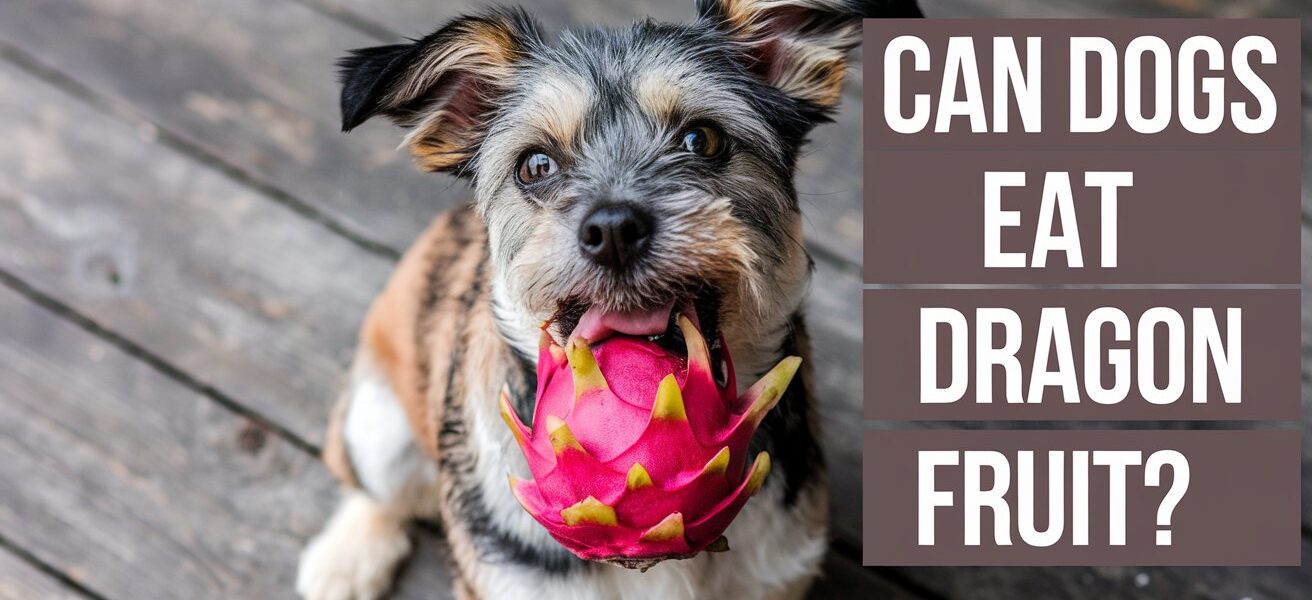
Can Dogs Eat Dragon Fruit?
What is Dragon Fruit?
Dragon fruit, or pitaya, is a tropical fruit that comes in different varieties, primarily recognized by its bright pink, red, or yellow skin and white or red flesh speckled with tiny black seeds. It’s packed with antioxidants, vitamins, and minerals, making it a healthy snack for humans. But is this exotic fruit safe for dogs?
Benefits of Dragon Fruit for Dogs
1. Rich in Nutrients
Dragon fruit is full of important vitamins and minerals, including:
- Vitamin C: Supports the immune system and skin health.
- Vitamin B: Aids in energy production and maintaining healthy brain function.
- Calcium and Iron: Essential for strong bones, muscles, and blood health.
- Antioxidants: Help fight off free radicals that cause cellular damage and contribute to aging.
2. High in Fiber
Fibers are very important for maintaining a healthy digestive system. Dragon fruit contains a good amount of dietary fiber, which can aid in regulating your dog’s bowel movements, preventing constipation, and promoting gut health.
3. Low in Calories
Dragon fruit is naturally low in calories, making it a suitable snack for dogs prone to weight gain or those on a controlled diet. You can reward your dog without worrying about extra calories.
4. Hydrating
With a high water content, dragon fruit can help keep your dog hydrated, especially during hot weather or after physical activity. Staying hydrated is key for overall health and well-being.
How to Safely Feed Dragon Fruit to Your Dog
While dragon fruit is generally safe for dogs, it’s important to prepare it properly to avoid any risks.
1. Remove the Skin
The skin of dragon fruit, though not toxic, can be tough for dogs to digest. Always peel the fruit and remove the skin before offering it to your pet. The flesh inside is soft and easy to consume, making it a much better option for your dog.
2. Cut into Small Pieces
Dragon fruit can be slippery and may pose a choking hazard if given in large chunks. Cut the fruit into small, bite-sized pieces to make it easier for your dog to chew and swallow.
3. Start with Small Portions
Even though dragon fruit is safe, your dog might have a sensitive stomach, especially when trying new foods. Start with a small amount and monitor your dog for any signs of digestive upset, such as vomiting or diarrhea.
4. Avoid Overfeeding
As with all treats, moderation is key. Dragon fruit should only be given as an occasional snack, not a staple in your dog’s diet. Overfeeding can lead to digestive issues or an unbalanced diet.
Potential Risks of Feeding Dragon Fruit to Dogs
While dragon fruit is generally safe, there are a few things to keep in mind when offering it to your dog:
1. Digestive Upset
Some dog breeds are sensitive and can not digest new foods than others. Ingesting too much dragon fruit can cause gastrointestinal issues like diarrhea or vomiting. Always introduce it slowly and monitor your dog’s reaction.
2. Allergic Reactions
Although rare, some dogs may have allergies to certain fruits. Some important Signs of an allergic reaction include itching, inflammation, and difficulty in breathing. If you notice any of these symptoms after feeding your dog dragon fruit, stop immediately and consult your veterinarian.
3. Sugar Content
Dragon fruit contains natural sugars, which can contribute to weight gain and dental problems if consumed in large quantities. While it’s a healthy treat in moderation, too much sugar can be harmful, particularly for dogs prone to obesity or diabetes.

Can Puppies Eat Dragon Fruit?
Puppies have more sensitive digestive systems than adult dogs, and their diet needs to be carefully monitored. While puppies can eat dragon fruit, it’s best to consult with a vet before introducing any new foods, especially fruits.
How Often Should Dogs Eat Dragon Fruit?
As with any fruit, dragon fruit should only be given as an occasional treat. The majority of your dog’s diet must come from well-balanced dog food that meets all their nutritional needs. We recommend offering dragon fruit no more than once or twice a week, and always in small, controlled portions.
Safe alternatives to dragon fruit
Safe alternatives to dragon fruit for dogs include:
- Apples (remove seeds and core) – Rich in vitamins A and C.
- Blueberries – These are full of antioxidants and also they are low in calories.
- Bananas – High in potassium and fiber, great for digestion.
- Watermelon (seedless) – They are low in calories and hydrating.
- Strawberries – Full of vitamins and antioxidants.
- Pineapple (in small amounts) – Contains digestive enzymes and vitamin C.
- Cantaloupe – Hydrating and full of vitamins, but serve in moderation.
Conclusion: Can Dogs Eat Dragon Fruit?
In conclusion, dogs can safely eat dragon fruit, and it provides several nutritional benefits when offered in moderation. The high levels of vitamins, antioxidants, and fiber make it a healthy and hydrating snack for your dog. Just remember to remove the skin, cut the fruit into small pieces, and start with small amounts to avoid any potential digestive upset.
FAQs: Can Dogs Eat Dragon Fruit
- Is dragon fruit toxic to dogs?
No, dragon fruit is not toxic to dogs. It is safe for dogs to eat in small amounts. - Is any part of dragon fruit poisonous?
The skin of dragon fruit is not poisonous, but it is tough to digest, so it should be removed before feeding to dogs. - Are any fruits poisonous to dogs?
Yes, some fruits are poisonous to dogs, including grapes, raisins, cherries, and the pits of peaches, apricots, and plums. - Is dragon fruit good for cats and dogs?
Yes, dragon fruit is safe and can be beneficial for both cats and dogs when fed in moderation, as it contains vitamins, antioxidants, and fiber.

Jahanzaib Kaleem is a passionate and knowledgeable pet writer and veterinarian dedicated to enhancing the well-being of pets and educating pet owners around the world. With years of experience in veterinary medicine and a deep love for animals, Jahanzaib combines his medical expertise with a flair for writing to deliver insightful and practical advice on pet care.





